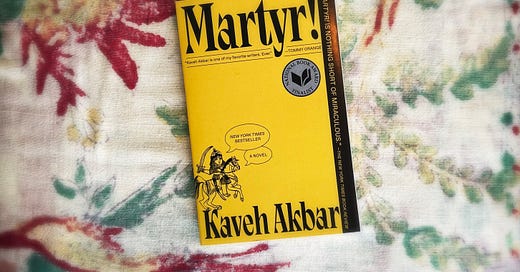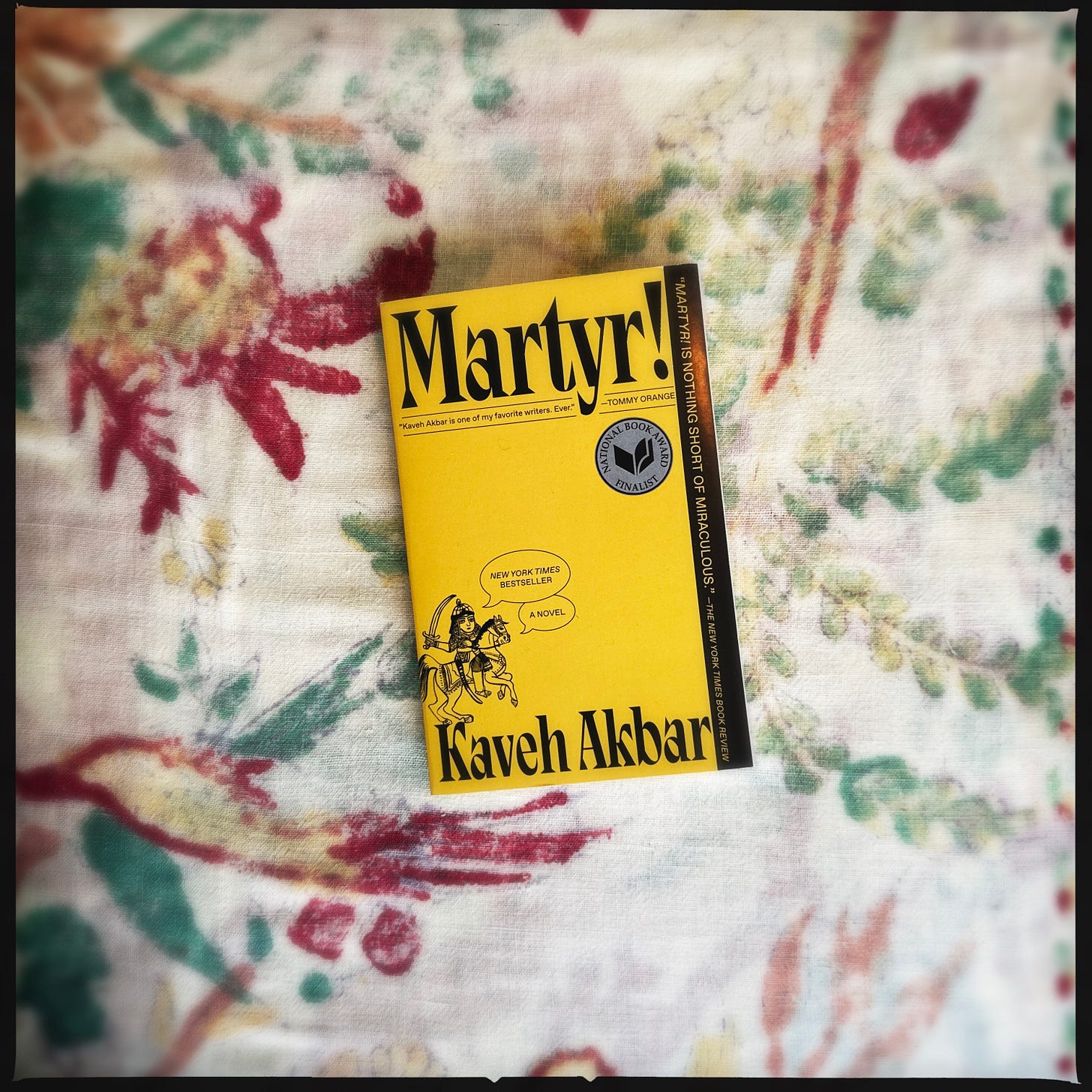I have books on the brain since we rolled out the “Analog Mix Sometimes Obscure ’80s Bookclub” podcast series. Ok, who am I kidding, I pretty much always have books on the brain. A lot of my online reading these last couple of weeks has been filled with year-end roundups and best-of lists from Substackers and bookstagrammers I follow.
This won’t be one of those comprehensive lists.
I read a decent number of books this year. Fewer than previous years, I think — I didn’t keep track in any reliable way, but according to the timeline on my Libby app, I checked out and finished more than 50 books there.1 Plenty of what I read last year was good, some of it great.
But one of those books has stayed with me since March. Has haunted me. Keeps popping into my head, knocking on the doors in my consciousness, putting a foot in the jamb, asking to be let in again. The end in particular has me in its jaws. I’ll read it again, probably more than once.
I’m burying the lead … the book is Martyr! by Kaveh Akbar.
Here’s the thing, I’m not delusional, I know this book is on every one of those best-of lists, so you probably don’t need this recommendation. Except, if you’re here with us, maybe it’s cool and you’re happy to have my endorsement if you haven’t already picked it up?
Here’s the other thing: I don’t actually want to tell you a lot about it. I just want you to read it.
But I’ll give you three things that have stuck with me:
1. The opening sentence and paragraph.2 Here, I’ll read it to you…
2. The use of a real historical event as a catalyst for the story and a thread in the narrative, with actual bits of news inserted as interstitials throughout. It’s a device I also loved in George Saunders’ Lincoln in the Bardo (Saunders strings together newspaper quotes into rhythmic prose poetry), and in a slightly different way in Tommy Orange’s There, There — both books that were also at the top of the heap for me in the years I read them.
“One of the things that fiction can do and one of the things that I certainly try to do in this book is to lend the granularity of specific grief to the abstraction of a collective loss. Which is to say, you have 290 people dead — ok, that’s data, right, but Cyrus’ mother was one of the people on that flight. And so this entire book springs out of that. This entire book, you know, every conversation that Cyrus has, every lover that he takes, every move that he makes is indelibly inflected by the fact that on July 3, 1988, USS Vincennes shoots Iran Air Flight 655 out of the sky. And thus we see the granularity of an individual loss, and then you’re like, ‘Wow, I bet those other 289 lives were as meaningful.’” —Kaveh Akbar, speaking in Des Moines, Iowa, March 2024
3. The end (before the CODA). I don’t know how to interpret the ending. Or I don’t want to believe one of the possibilities. I found myself, there at the end, feeling an awful lot like Cyrus in that first paragraph, wanting clarification. Wanting, possibly, a do-over for Cyrus if not for me.
Anyway, if you read it, let’s talk. I want to know what you think.
PS: Akbar is delightful to listen to. I had the pleasure of seeing him speak at our public library’s author series, and you can view that talk here:
Nineteen of those books comprise the entire (so far) Armand Gamache series by Louise Penny. If you need another of my recommendations for a read that zillions of people already know about, here you go. Like any long-running series, there are a few installments that go a little off the rails for me (ugh, creepy serial killers, and maybe a little too much high-level government corruption), but overall I love taking a fictional trip into Three Pines in southern Quebec and following Chief Inspector Gamache around. Be warned, however, these are book crack.
“Maybe it was that Cyrus had done the wrong drugs in the right order, or the right drugs in the wrong order, but when God finally spoke back to him after twenty-seven years of silence, what Cyrus wanted more than anything else was a do-over. Clarification. Lying on his mattress that smelled like piss and Febreze, in his bedroom that smelled like piss and Febreze, Cyrus stared up at the room’s single lightbulb, willing it to blink again, willing God to confirm that the bulb’s flicker had been a divine action and not just the old apartment’s trashy wiring.” —from Martyr! by Kaveh Akbar






Great book! It also left me wanting another ending but more for Cyrus. I read this months ago but I remember being floored by all the interactions in the museum.